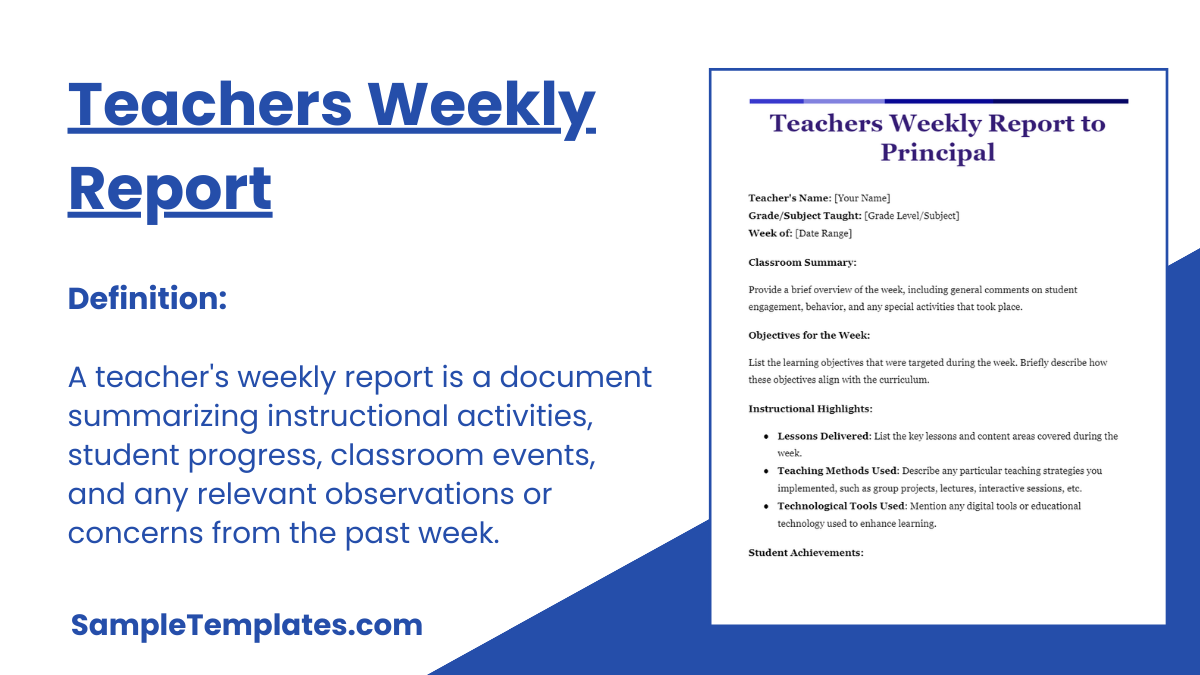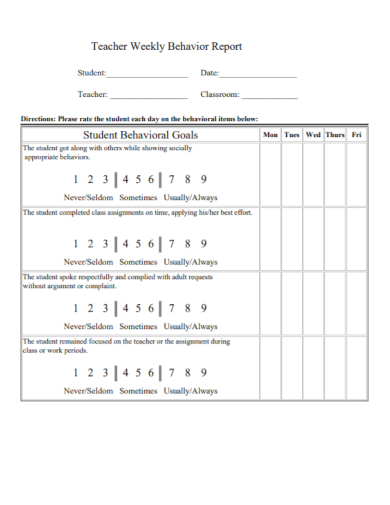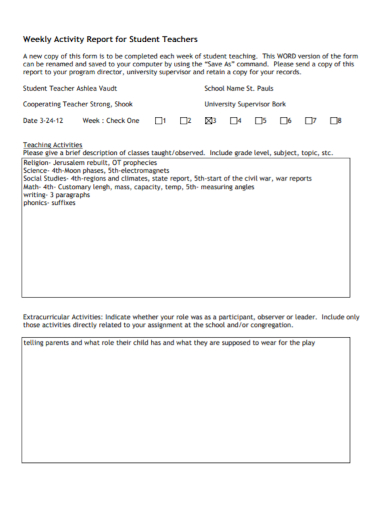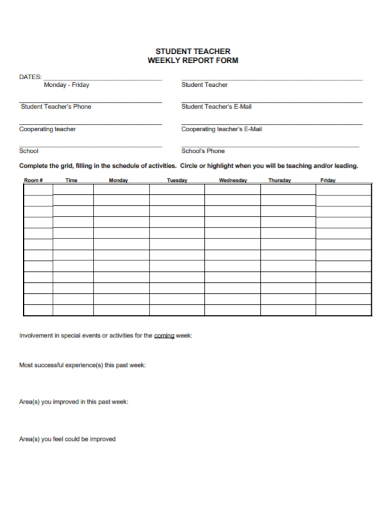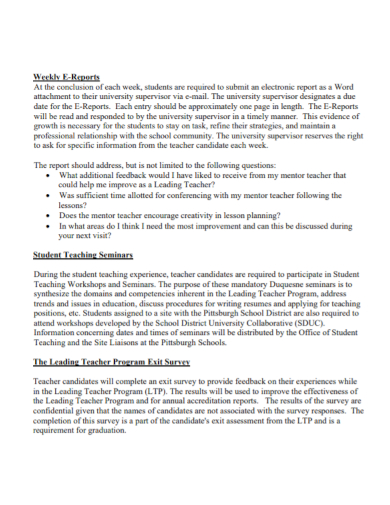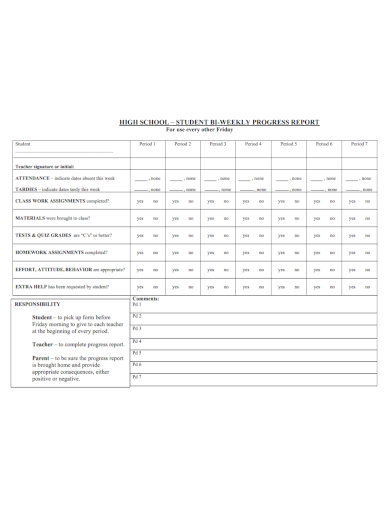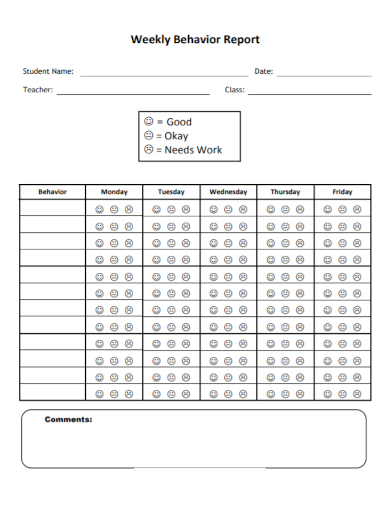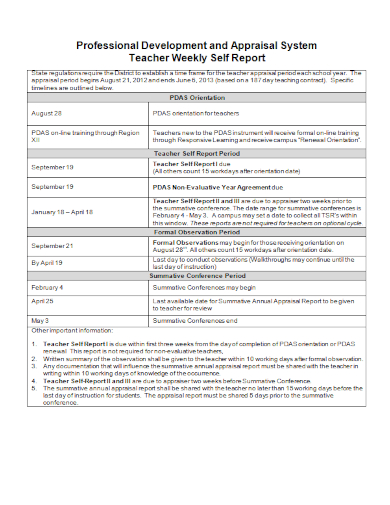Just as how students are required and entitled to file a sample report to track progress, it is the same way with teachers. Teachers are expected to perform three roles: someone that gives instruction in a classroom setting, develops paper for knowledge contribution, and contributes to the development of the society by community outreaches. This report would also help on progress tracker for these roles that they should be performing. Looking for easy ways to increase parent-teacher communication and keep parents informed about behavior and academics? This page will help you determine a workable method for updating all of your parents or just the ones whose children need extra accountability. It will also help you decide whether to update parents daily or weekly about behavior and explain ways to do each successfully. With the wide scope of this report, you might have a hard time making it from scratch. To avoid doing this, our site offers you wide variety and choices for Teacher Weekly Report. Just browse into these templates and choose the one that satisfies your needs the most.
For other report template needs, our site offers templates like Monthly Status Report, Project Weekly Status Report, Weekly Construction Progress Report, Individual School Report, Problem Solving Report, Daily Sales Report, Action Research Report, Construction Feasibility Report, Network Feasibility Report, etc. Our article does not only give you free and ready-made templates but also provide you with ideas that are essential in making one. So what are you waiting for? Come! Read the article with me.
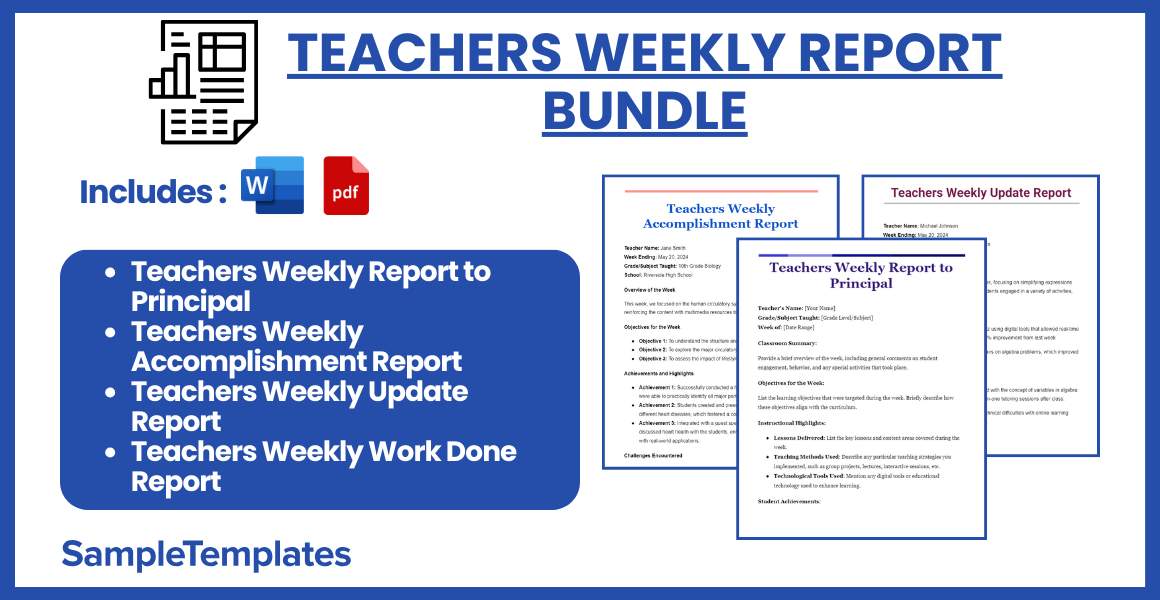
Download Teachers Weekly Report Bundle
Teachers Weekly Report to Principal
Teacher’s Name: [Your Name]
Grade/Subject Taught: [Grade Level/Subject]
Week of: [Date Range]
Classroom Summary:
Provide a brief overview of the week, including general comments on student engagement, behavior, and any special activities that took place.
Objectives for the Week:
List the learning objectives that were targeted during the week. Briefly describe how these objectives align with the curriculum.
Instructional Highlights:
- Lessons Delivered: List the key lessons and content areas covered during the week.
- Teaching Methods Used: Describe any particular teaching strategies you implemented, such as group projects, lectures, interactive sessions, etc.
- Technological Tools Used: Mention any digital tools or educational technology used to enhance learning.
Student Achievements:
Highlight specific achievements or improvements observed in students. This could include academic successes, notable improvements in skills, or positive behavioral changes.
Challenges Encountered:
Discuss any challenges faced during the week, whether they be academic, behavioral, or logistical. Include how these challenges were addressed or plans for future resolution.
Assessment and Evaluation:
- Tests/Quizzes Administered: Provide details of any assessments given during the week along with general performance trends.
- Homework Assignments: Summarize the nature and outcome of homework assignments.
Special Needs and Accommodations:
Note any specific accommodations made for students with special needs and the impact of these accommodations on the student’s learning experience.
Upcoming Plans:
Outline your plans for the coming week, including any changes in instructional strategies, upcoming tests, or special projects.
Requests or Needs:
Mention any support or resources needed from the administration to enhance classroom learning or address specific challenges.
Additional Comments:
Include any other information that may be useful for the principal, such as updates on ongoing projects, parent interactions, or professional development needs.
Signature:
[Your Signature]
[Date]
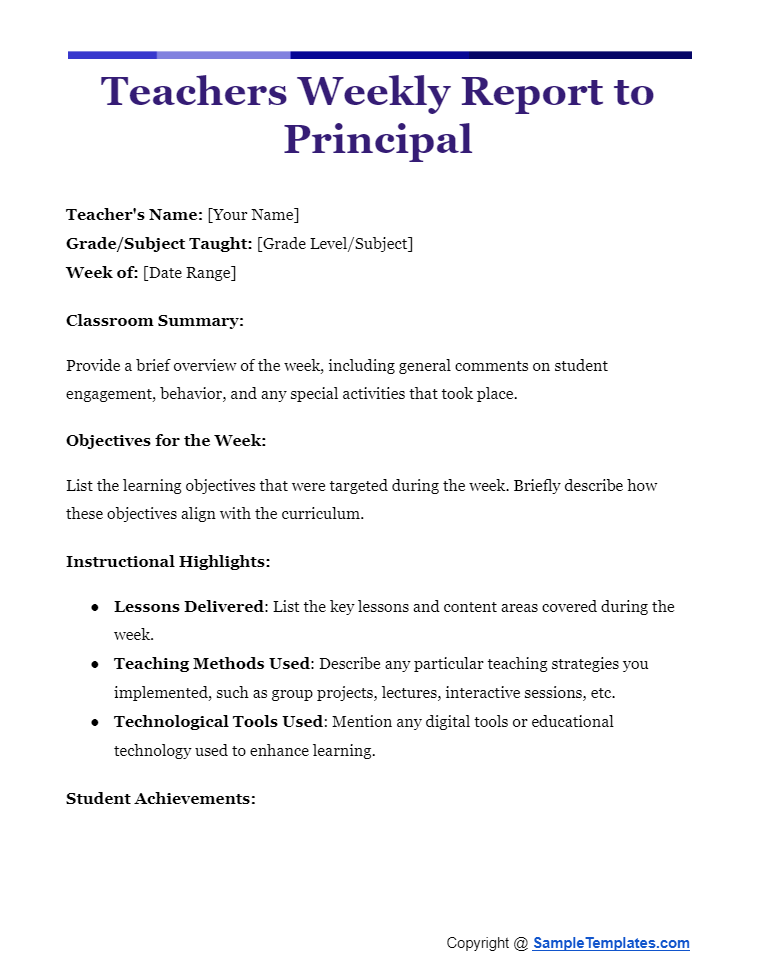
Teachers Weekly Accomplishment Report
Teacher Name: Jane Smith
Week Ending: May 20, 2024
Grade/Subject Taught: 10th Grade Biology
School: Riverside High School
Overview of the Week
This week, we focused on the human circulatory system, integrating lab activities, and reinforcing the content with multimedia resources to enhance student understanding.
Objectives for the Week
- Objective 1: To understand the structure and function of the human heart.
- Objective 2: To explore the major circulatory pathways and their functions.
- Objective 3: To assess the impact of lifestyle choices on heart health.
Achievements and Highlights
- Achievement 1: Successfully conducted a heart dissection lab, where students were able to practically identify all major parts.
- Achievement 2: Students created and presented digital presentations on different heart diseases, which fostered a collaborative learning environment.
- Achievement 3: Integrated a guest speaker, a local cardiologist, who discussed heart health with the students, enhancing their learning experience with real-world applications.
Challenges Encountered
- Challenge 1: Several students had difficulties understanding the blood flow through the heart. We addressed this by using a 3D simulation tool, which helped clarify the concept.
- Challenge 2: Limited lab resources initially hampered our dissection activity. We overcame this by scheduling rotations and borrowing additional equipment from the chemistry department.
Student Performance and Feedback
- Performance Highlights: Most students scored above 85% in the weekly quiz, showing a strong grasp of the circulatory system fundamentals.
- Areas for Improvement: Need to improve engagement in larger group discussions.
- Student Feedback: Students enjoyed the practical aspects of the curriculum but requested more varied assessment types beyond quizzes and tests.
Professional Development
- Professional Development Activity 1: Attended a webinar on “Innovative Approaches to Teaching Science,” which provided new strategies for using virtual labs effectively.
- Professional Development Activity 2: Read the article “The Future of Biology Education,” which has prompted me to integrate more technology into the classroom.
Goals for Next Week
- Goal 1: To introduce the respiratory system and explore its interconnection with the circulatory system.
- Goal 2: To implement a peer-teaching session, where students explain concepts to each other to reinforce their understanding.
- Goal 3: To prepare students for the upcoming unit test by reviewing key concepts and conducting mock exams.
Additional Comments
Looking forward to using more interactive tools to enhance student engagement and understanding in the upcoming topics. Also, planning a mid-term feedback session to gather more student insights on the course.
Signature:
Jane Smith
Date: May 20, 2024
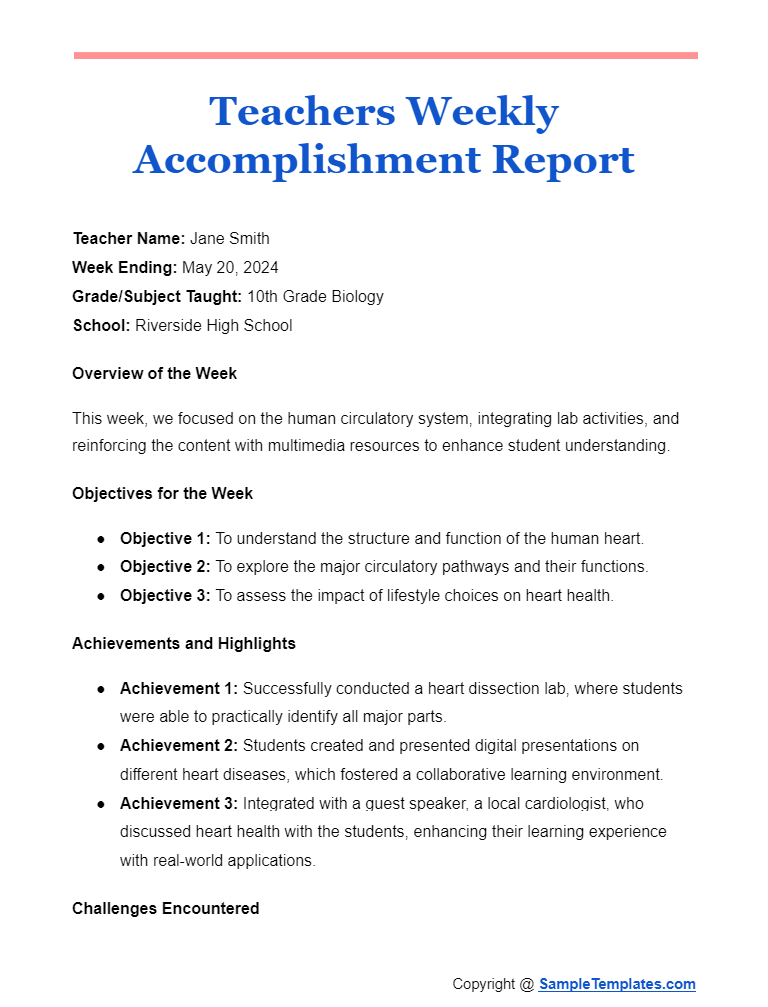
Teachers Weekly Update Report
Teacher Name: Michael Johnson
Week Ending: May 20, 2024
Grade/Subject Taught: 7th Grade Mathematics
School: Central Middle School
Summary of the Week
This week, we delved into algebraic expressions, focusing on simplifying expressions and solving basic algebraic equations. The students engaged in a variety of activities, including group work and interactive quizzes.
Key Achievements
- Interactive Quiz: Conducted an interactive quiz using digital tools that allowed real-time feedback and saw an 80% class average, a 10% improvement from last week.
- Student Collaboration: Students worked in pairs on algebra problems, which improved their problem-solving skills and teamwork.
Challenges Encountered
- Conceptual Hurdles: Some students struggled with the concept of variables in algebra. Additional support was provided through one-on-one tutoring sessions after class.
- Resource Limitations: Encountered some technical difficulties with online learning tools which intermittently disrupted the quizzes.
Classroom Activities
- Group Discussions: Organized group discussions where students explained algebraic concepts to their peers, enhancing understanding and confidence.
- Problem-solving Session: Held a hands-on problem-solving session which involved students creating their own algebraic equations based on real-life scenarios.
Student Engagement
- Participation Levels: Noticed an increase in class participation, especially from students who typically shy away from mathematics.
- Feedback: Student feedback was positive, particularly regarding the interactive nature of the quizzes and the relevance of the problem-solving activities.
Goals for Next Week
- Introduce New Topic: Plan to introduce inequalities and their graphical representations.
- Enhance Resources: Aim to resolve the technical issues with the online quiz platform and explore additional digital resources to support learning.
Professional Development
- Webinar Attendance: Attended a webinar on “Integrating Technology in Math Education,” which provided insights into new digital tools and resources that could be incorporated into the curriculum.
Additional Comments
I am exploring more ways to integrate technology in an effective manner that complements traditional teaching methods and enhances student learning outcomes.
Signature:
Michael Johnson
Date: May 20, 2024
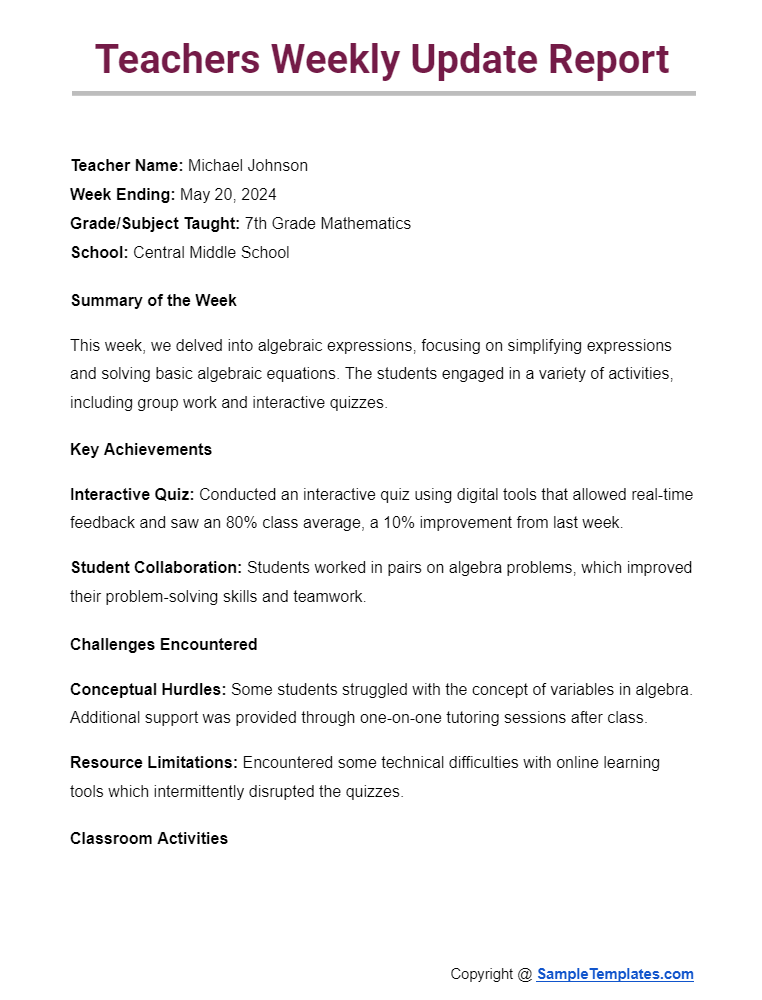
Teachers Weekly Work Done Report
Teacher Name: Emily Carter
Week Ending: May 20, 2024
Grade/Subject Taught: 8th Grade English
School: Westside Middle School
Overview of the Week
This week, our focus was on enhancing reading comprehension skills and beginning our unit on narrative writing. The students engaged in various reading activities and began drafting their first narrative essays.
Objectives Achieved
- Reading Comprehension: Completed three reading comprehension exercises aimed at identifying themes, main ideas, and supporting details in texts.
- Narrative Writing Introduction: Introduced narrative writing techniques and brainstormed potential essay topics with the students.
Detailed Activities
- Monday:
- Reading comprehension task with a short story, “The Hidden Treasure.”
- Discussion on identifying themes and main ideas.
- Tuesday:
- Group activity analyzing character development in the story.
- Introduction to narrative writing elements.
- Wednesday:
- Students began drafting their essays, focusing on setting and character development.
- Individual conferences to discuss essay outlines.
- Thursday:
- Continued essay drafting, with a focus on creating tension and pacing.
- Peer review session on draft essays.
- Friday:
- Final discussions on narrative techniques.
- Homework assigned to complete the first draft of the narrative essay.
Challenges Encountered
- Engagement Issues: Some students found it challenging to develop their stories beyond basic ideas. Implemented additional one-on-one brainstorming sessions to help these students expand their narratives.
- Resource Needs: Noted a need for more examples of narrative essays. Plan to integrate more sample readings into next week’s lessons.
Student Progress
- Notable Improvements: Several students who typically struggle with creative writing have shown significant improvement in their ability to express detailed narratives.
- Feedback: Students responded positively to peer review sessions, noting that they found the feedback from classmates helpful for revising their drafts.
Plans for Next Week
- Objective: To refine and edit narrative essays, focusing on the use of descriptive language and effective dialogue.
- Activities: Editing workshops, a mini-lesson on dialogue writing, and a class discussion on incorporating sensory details into narratives.
Professional Development
- Attended Workshop: Participated in a workshop on “Creative Writing in the Classroom,” which provided new strategies for teaching narrative writing effectively.
Additional Comments
Looking forward to seeing the final essays and planning a small publication of the best works in our school newsletter.
Signature:
Emily Carter
Date: May 20, 2024
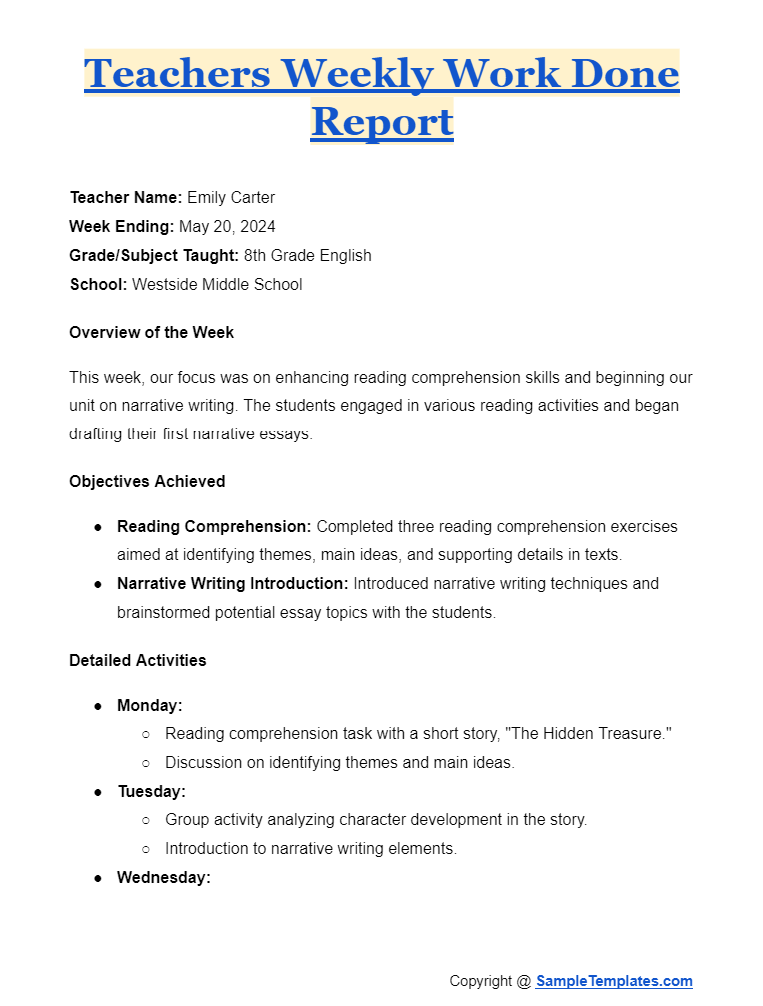
Browse More Templates On Teachers Weekly Report
1. Teacher On Duty Daily Report Sample
2. Sample Of Teacher On Duty Report
What to Include in a Weekly Report?
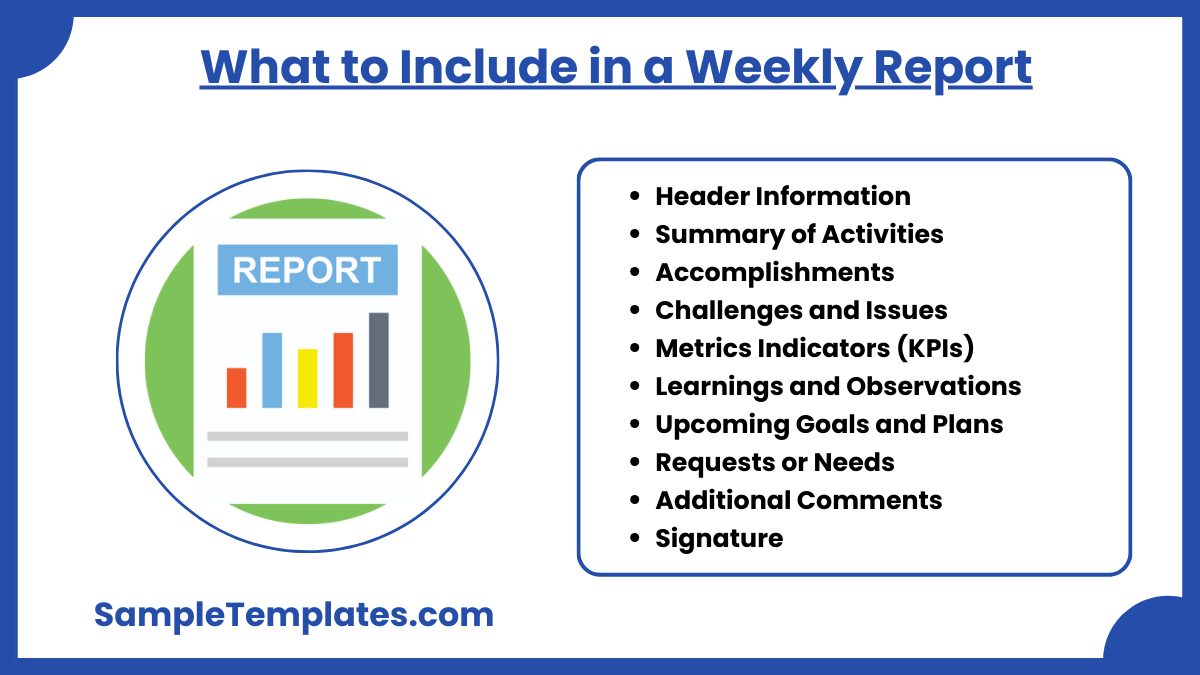
Creating a weekly report involves summarizing key activities, accomplishments, challenges, and sample plans to keep your team and management updated on your progress. Here’s what to typically include in a well-rounded weekly report:
- Header Information:
- Date: The date or date range the report covers.
- Name/Department: Your name or the department you are reporting from.
- Report Number: If applicable, especially if these reports are filed or tracked.
- Summary of Activities:
- Briefly describe the main activities you or your team have been working on during the week. This should include significant tasks completed or in progress. You can also see more on Construction Feasibility Report.
- Accomplishments:
- List key achievements from the week. Highlight any milestones reached, goals accomplished, or specific outputs that were completed. Quantify these accomplishments where possible (e.g., increased sales by 15%, completed 3 major project milestones).
- Challenges and Issues:
- Identify any challenges or issues encountered during the week. Describe how they impacted your work and whether they are ongoing or were resolved. Include any steps taken to address these challenges.
- Metrics or Key Performance Indicators (KPIs):
- Include relevant metrics or KPIs that you are tracking. This might be sales numbers, website traffic, production output, etc., depending on your role and industry. You can also see more on School Visit Report.
- Learnings and Observations:
- Reflect on what was learned during the week. This might include insights into project management, team dynamics, or operational efficiencies.
- Upcoming Goals and Plans:
- Outline the primary goals for the upcoming week. This helps in setting expectations and aligning your focus. You can also see more on Teacher Attendance Report.
- Requests or Needs:
- If you need support, resources, or information from others, specify your requests. This can include requests for meetings, help from other departments, or resource needs.
- Additional Comments:
- Include any other information that might be relevant to the reader, such as upcoming absences, external factors affecting work, or acknowledgments of exceptional team contributions.
- Signature or Acknowledgment:
- End with a signature or a standard closing to authenticate the report.
3. Teachers Weekly Report Sample
4. Class Report Sample For Teachers
Benefits of Teachers Weekly Report
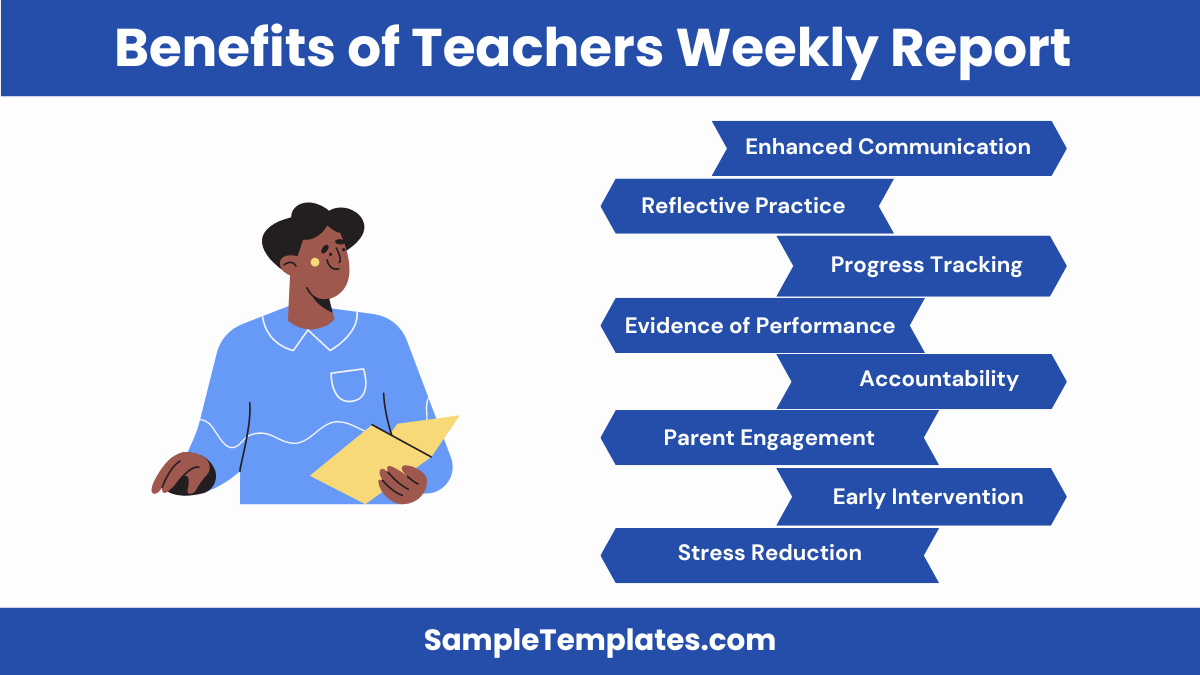
Teachers’ weekly reports format provide numerous benefits for both the educators themselves and their broader educational environment. Here are some of the key advantages of maintaining a weekly report system for teachers:
- Enhanced Communication:
- Weekly reports facilitate regular communication between teachers, school administrators, and other staff. They ensure everyone is aware of what is happening in the classroom, which can promote a more collaborative environment. You can also see more on Weekly Report.
- Progress Tracking:
- These reports allow teachers to track the progress of their students and themselves over the course of the school year. Documenting weekly outcomes helps in identifying trends, areas of improvement, and the effectiveness of different teaching strategies.
- Reflective Practice:
- Writing weekly reports encourages teachers to reflect on their teaching practices. This reflection can lead to a deeper understanding of what works or doesn’t work and foster professional growth and development.
- Accountability:
- Regular reporting keeps teachers accountable for their educational goals and student outcomes. It provides a structure that can help maintain focus and motivation throughout the academic year. You can also see more on Progress Report.
- Planning and Organization:
- By regularly documenting activities and outcomes, teachers can better plan future lessons and organize materials and resources effectively. This helps in maintaining a structured and efficient classroom environment.
- Early Intervention:
- Weekly reports help in identifying students who may be struggling with certain concepts or who are excelling and may benefit from advanced materials. Early detection of these issues allows for timely interventions, which can significantly affect student learning outcomes.
- Parent Engagement:
- Sharing weekly reports with parents can enhance engagement with their child’s education. It provides parents with a clear understanding of what their children are learning and how they are performing, encouraging more supportive home environments.
- Evidence of Performance:
- Teachers’ weekly reports can serve as evidence of their efforts and effectiveness, which can be useful during evaluations, promotions, and when seeking professional development opportunities. You can also see more on Behavior Report.
- Stress Reduction:
- Regularly documenting challenges and achievements can help in managing stress by organizing thoughts and clarifying next steps. It also allows teachers to offload concerns in a constructive manner.
- Supports Professional Collaboration:
- When teachers share insights and data from their weekly reports with colleagues, it can lead to collaborative problem-solving and sharing of best practices, enhancing the educational experience for all students.
Overall, teachers’ weekly reports are a valuable tool for improving educational outcomes, enhancing teacher performance, and building stronger school communities.
5. Progress Weekly Teachers Report
What is the Performance of Teacher?
6. Sample Of Duty Report For Teachers
7. School Weekly Report Sample
Teacher Reports
Reports may be sent home for the entire class, or only for particular students. If you have a very involved group of parents who would appreciate having regular sample feedback, I would suggest having a routine system for every child in the class. It may also be helpful to do reports for every child if you have a very challenging class that would benefit from extra accountability.
You don’t have to make a decision on this before school starts. It’s okay to wait and see how things go with your particular group! Once you understand your students better, you can introduce a reporting system to individuals or the whole class a few weeks into the school year.
Using Tracking Form To Monitor Behaviors
If you feel the need to keep detailed records of behavior or your school district requires it, you might consider a very simple and effective system I used many years ago when my grade level team agreed to do it that way.
We gave weekly evaluation grades based on a tracking sample form we used for recording students’ behavior. When students had behavioral issues, we made a check mark. Next to each check, we wrote an abbreviation for the infraction (T for talking, F for fighting, etc.). At the end of the week, we totaled up how many checks each student had and assigned a Social Skills grade using the key shown on the weekly evaluation form.
We used the same tracking sheet to record whether students had any missing or incomplete homework and class work assignments. At the end of the week, we gave a work habits grade to each child (see the key on the bottom of the weekly evaluation form). If your school district uses a numerical scale for work habits, just convert the letter grades to whatever system your district uses. For example, if the scale is 1-3, then use this key: 1=Outstanding (0-1 checks), 2=Satisfactory (2-3 checks), and 3=Improvement Needed (4+ checks).
Report On Academic Progress
Most daily or weekly evaluations address work habits and social growth but don’t give a clear picture of how students are doing academically. We all have conscientious and well-behaved students who are working far below grade level, and conversely, kids who are always in trouble but still manage to get good grades. The typical weekly evaluation form can leave parents and children feeling very surprised when report card time rolls around if the teacher isn’t clear about the form’s limitations!
Experienced educators should definitely consider having a regular method for updating parents on children’s academic growth. If your school system has already overloaded you with sample paper trails, this may not be needed. But if you’d like documentation of how you routinely provide student progress information to parents, I have several methods you can try. I’ve listed them in order from the simplest to the most complex. Each one can be adapted to include social skills and work habit information, as well, so that you don’t have to do a separate behavior report.
You might find yourself getting caught up in the report outline that you are making especially that you’ve got to do it from the very scratch. With this, it is highly encouraged of you to make available all the resources you can find online. What are you waiting for? Avail our templates in SampleTemplates now!
FAQs
1. What should a weekly report look like?
Reports should be clear and concise. They should not ramble on about standard, weekly tasks, and contain everything you have done during the week. Your weekly report activities should be no longer than a page if you’re writing them out physically, and no more than 3-10 items if you are using software.
2. How is report written?
Essentially, a report is a short, sharp, concise document which is written for a particular purpose and audience. It generally sets outs and analyses a situation or problem, often making sample recommendations for future action. It is a factual paper, and needs to be clear and well-structured.
3. What is the weekly progress report
The weekly progress report provides a snapshot of accomplishments, challenges, and goals. It tracks student performance, highlights teaching strategies, and fosters communication between educators, students, and parents.
4. How to Write an Effective Weekly Report
Summarize key achievements and challenges, detail completed tasks with impact, address obstacles and propose solutions, use quantitative data, highlight team contributions, maintain a positive tone, and outline upcoming goals.
5. How do you write a report as a teacher?
As a teacher, craft a report by summarizing student progress, highlighting strengths and areas for improvement, detailing teaching strategies, fostering parent communication, and setting future learning goals. You can also see more on Project Weekly Status Report.
6. How do you write a report on a teacher’s performance?
Evaluate a teacher’s performance by objectively analyzing classroom effectiveness, communication with students and colleagues, adherence to curriculum, professional development, and overall impact on student learning outcomes.
In conclusion, this weekly report encapsulates the dedication and effort invested by our teachers. Their commitment to fostering a positive learning environment is evident. As we celebrate achievements and address challenges, it underscores the collaborative spirit driving our educational community. Together, we strive for continuous improvement and student success.
Related Posts
FREE 14+ Employee Payroll Samples
FREE 11+ Sample Executive Report
FREE 10+ School Visit Report Samples
FREE 9+ Tutor Report Form Samples
FREE 8+ Sample Weekly Log
FREE 8+ Sample Book Report
FREE 8+ Sample Teacher Newsletter
FREE 8+ Accomplishment Report Samples
FREE 8+ Sample Acknowledgment Report
FREE 5+ Sample Teacher Evaluation Forms
FREE 17+ Sample Student Progress Reports
FREE 16+ Sample Summary Reports
FREE 11+ Sample Security Report
FREE 10+ Milestone Report Samples
FREE 10+ Science Research Report Samples
